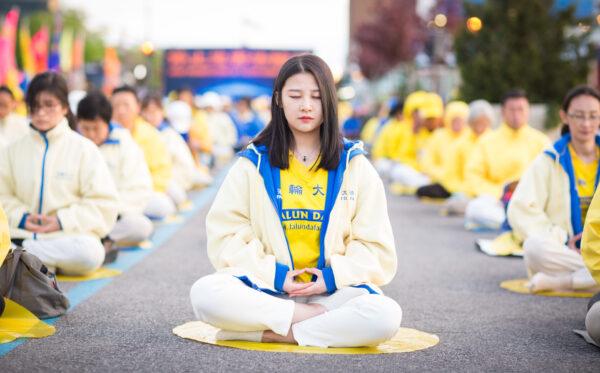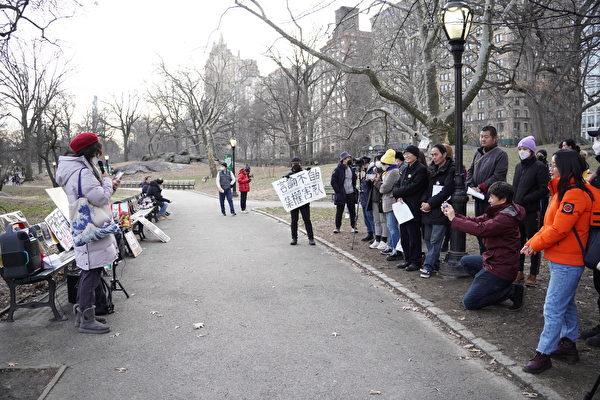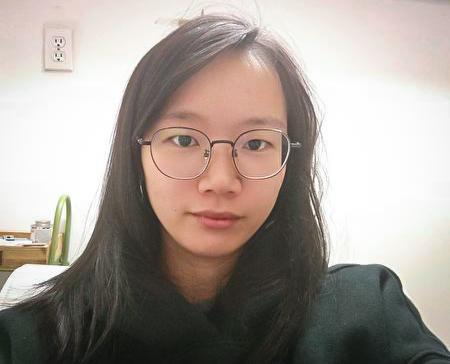Su Biwen is a confident woman from Fujian on China’s southeastern coast. She’s well aware of the pervasive communist brainwashing in China, she’s against the forced military reunification of Taiwan with the Chinese mainland, and she’s made a clear distinction between herself and China’s young cyber-nationalists.
Within a few months of her arrival in New York, however, she realized that the communist indoctrination she experienced had had a deep effect on her after all. It took time to let it go, but now she says she feels reborn after experiencing life in New York.
Encountering Falun Gong
Su was born in 1997, studied for and earned a major in English, and worked in an international trading company. She came to New York when the white paper movement erupted in China.She took the book, but avoided talking to the Falun Gong adherent who had offered it to her. Among the untruths she’d been indoctrinated with since kindergarten were scary stories about Falun Gong.
Falun Gong, also known as Falun Dafa, is a mind and body practice that follows the universal principles of truthfulness, compassion, and tolerance, and is rooted in 5,000 years of Chinese culture and history. Since the introduction of the practice in 1992, Falun Gong has attracted tens of millions of adherents worldwide with its tranquil exercises and meditation, as well as its teachings on becoming a better person.
Su recalled that China’s communist state propaganda had taught her that Falun Gong was something akin to a pyramid scheme; that adherents would commit self-immolation; and that practitioners were against the Communist Party. “Parents would say so, friends and classmates would say so,” she said.
When she saw the Falun Gong adherents in Flushing, she thought: “It is really free in New York. You can have any belief.”

After Su settled in Manhattan, she would pass by Pennsylvania Station every day. She saw that there were often some people there doing exercises—sometimes even accompanied by flocks of doves—on the Post Office steps at Penn Station. She was amazed to find that they were Falun Gong practitioners, and that many of them were not of Asian descent.
At an event she attended in February, she made a new acquaintance that Su thought was “as sweet as an angel.” When they sat down for a cup of coffee together, she was even more surprised to find that the girl was a Falun Gong practitioner.
“It can’t be! How could she practice Falun Gong?“ Su thought to herself. ”She looks normal, and her physical condition is much better than mine.”
The girl offered Su some advice on adjusting to life in New York, namely to “relax, sleep well, eat well, and try to settle down first—to just calm myself down.” Su could feel her inner world crumbling as the girl, a complete stranger, gave her the sweetest advice—better, she felt, than even her parents could have given.
Su suddenly realized how many lies she’d been told about Falun Gong. “I had lived in a world of lies,” she said.
“It is because the mainlanders have lost their capability to think,“ she concluded. ”They only believe in the CCP.”
She admitted that in the past, she only focused on her own business, job-related issues, and the things that she was fond of personally. Major issues or matters involving principles and beliefs were things that she had never paid attention to when she surfed online.
“I only learned the facts of Falun Gong after I met Falun Gong adherents in person, live,” she said. Su said she’s certain they are not what the CCP has portrayed them to be. “I feel that they are nice and kind, even more so than the average people,” she said.
She agreed that Falun Gong adherents are subject to a very difficult and dangerous situation in China. “People would report the adherent to the police, but that doesn’t mean those people are bad,“ she said. ”They reported the adherents to the police because they wanted to stop the adherents from going to extremes, from performing self-immolation and the like. That’s how much the CCP has demonized Falun Gong.”
Under the atmosphere created by the CCP, everyone has been brainwashed, and everyone would say the same things about Falun Gong. “I read the facts about Falun Gong [when I came to New York], but I didn’t believe what I read there either,” she said, referring to information available on the internet outside of China that tells the truth about Falun Gong.
Seeing Through the CCP
At a February event in Central Park commemorating Li Wenliang, the Wuhan whistleblower who brought the COVID outbreak to light, Su saw some Chinese participants who were wearing masks.
Su was amazed by their fear of the CCP—despite their being in New York. They didn’t wear the masks for fear of the pandemic, Su believes: They feared that CCP spies would report them. She said, “I can’t believe that we are in New York, but we still need to protect ourselves from the CCP. Its arms have stretched too far.”
She gradually came to realize that the CCP is not just a political party. “It is more like a religion,” she said.
The stark contrast between America and China has turned her world upside down.
She said that in China, the CCP is working to eliminate all religions. She said that on personal documents and forms, she used to fill in the category marked “Religion” on the documents with the word “none”—simply so that she would avoid getting herself into trouble.
But in America, she said, it seems that almost everyone has faith in God, or at least a belief system of some sort. In many circles in the United States, she has found, people seem to frown upon those who do not profess any faith.
In China, she explained, the CCP considers those who have faith in God to be mentally ill. “Only non-science believers would fall for a religion. That’s what’s publicized in the whole nation,” she said.
When she learned how historically, China, Japan, and Korea have had religious exchanges, and that Taoism still exists in Taiwan, it was a cultural shock to her.
“I was taught that all religions were gone,” she said. She ultimately realized that in Chinese history, Taoism and Buddhism existed on the mainland even when China was ruled by external ethnic groups.
“The CCP’s history textbooks are just a joke, filled with hardly any facts, just opinions. The Cultural Revolution was much worse and more cruel than I had imagined.
“To put it simply, even though I was reading overseas news every day by evading the firewall, as long as I was inside China, I was brainwashed,” she said.
The series of shocks jolted her to a rude awakening.
Loving the USA
Su sees America as a place where she can realize her dreams.She wanted to be a lawyer, but everyone in China told her she was too old for that. In America, however, she said she has been encouraged by almost everyone, and advised to make a living with her real estate business first before pursuing her dream of going to law school.
“In China, whatever you do, whatever you study, you’ll think of whether the CCP would like it, if it has a future … the path is really narrow,” she said.
Due to the lack of spirituality in most people’s lives, the Chinese pursue money, she said, and live a very difficult life of endless struggle. “Life is so hard for mainlanders,“ she said, ”unlike Americans or people from Taiwan, who have beliefs, hold humane thoughts, and know when to slow down to relax.”
In China, everyone just wants to succeed, she said: The rich want to be richer, and so they work, they struggle, they don’t rest, and many young people even die of exhaustion. “Two of my classmates have died,” Su said.
She’s most comforted by the freedom offered by America. She is enjoying the expression of her true feelings, which she feels is very much welcomed and appreciated here in the United States.
She gave the example of how dangerous it can be for students in China to openly oppose the military coercion of Taiwan. “When the teacher asks if there’s any question, you have to answer ‘No!’ You have to follow the trend.”
But in the United States, in contrast, people consider it a positive thing when you express your own thoughts, and seem to appreciate it, she said.
She knows America is not paradise, and that there are social issues, such as drug abuse and homelessness, but the atmosphere of freedom and tolerance in the United States has given her hope.
Su Biwen’s life is filled with aspirations, and there’s opportunity everywhere. She said, “I feel reborn. It’s like I am living on another planet, a brand-new planet.”
Life is too short and too precious to live otherwise, she said. “I have wasted 25 years of my life in China. I want to live the rest of my life in a country like the United States”—where her dreams can flourish.




